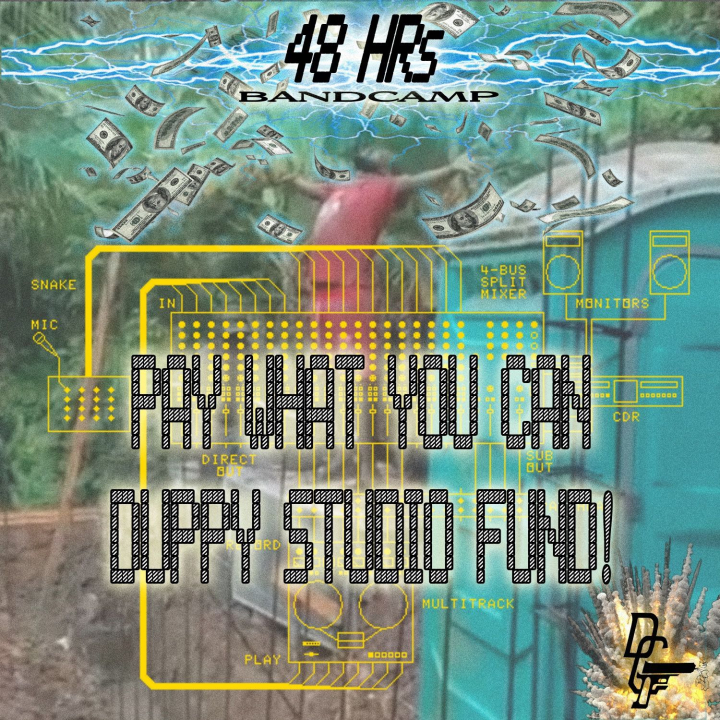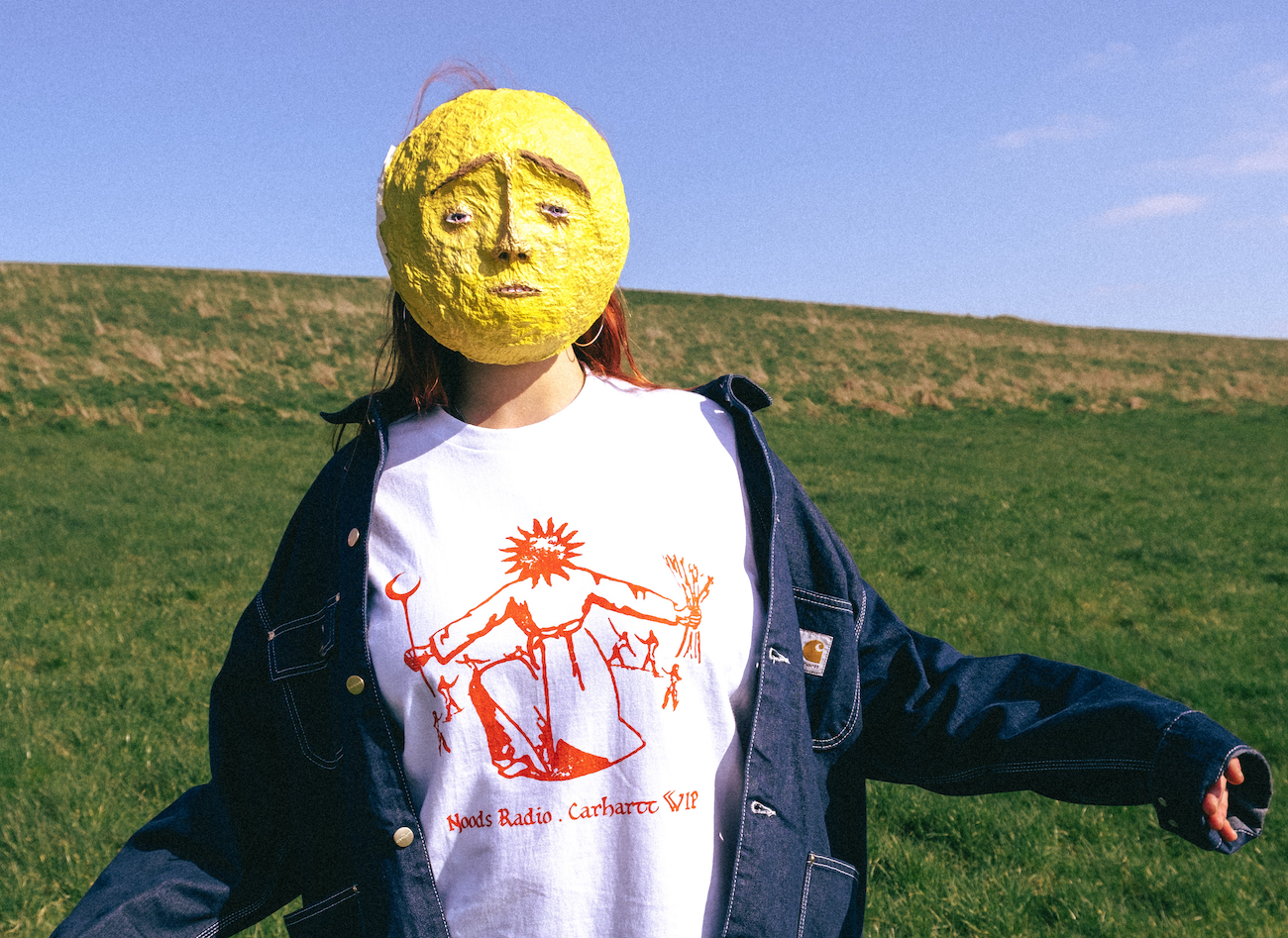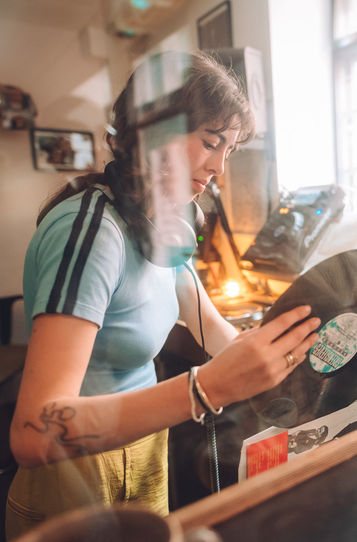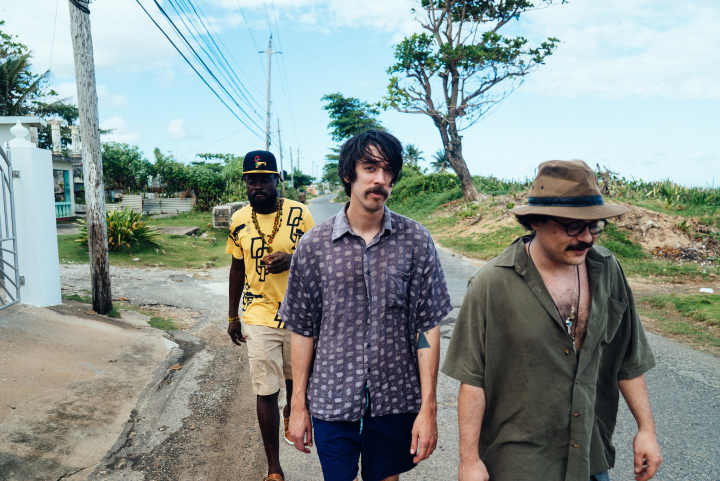
Duppy Gun: Lyrical Not Physical
For the last 10 years, Duppy Gun has been releasing twisted dancehall experiments, pairing some of Jamaica’s most exciting vocalists with experimental producers from across the world. We spoke to the four label heads, Sun Araw, M. Geddes Gengras, I-Jahbar and Miles ‘Bokeh Edwards’, to find more about the story of Duppy Gun.
The mysterious Duppy Gun is a flower native to the Caribbean region. It’s professed to have medicinal properties, often brewed into a tea that’s said to be an ailment for coughs, colds and intestinal diseases, and a naturally occurring aphrodisiac. For the last 10 years, Duppy Gun has also been the name for a cross-continental, collaborative musical project as wild as the flower itself, connecting artists from all across the world. The Duppy Gun story is one about connections in the most unlikely of circumstances, transcending borders, scenes and screens in a quest to create adventurous, uninhibited music.
Duppy Gun began as a one-off collaborative project between L.A. based multi-instrumentalist Sun Araw (Cameron Stallones), M. Geddes Gengras and veteran roots group The Congos. Since then, Duppy Gun has since grown into a vital hub for experimental club music, connecting Jamaican artists with producers from around the world. Over time and with Duppy Gunn I-Jah has become legendary Jamaican vocalist I-Jahbar and has emerged as the figurehead of the project, using his array of connections to build a talented roster of vocalists from its hub in Jamaica. Together, they have developed an eclectic back catalogue that combines murky, experimental production with razor sharp lyricism from a rotating cast of supremely talented Jamaican artists.
Collaboration is at the heart of the project. Initially, Stallones and Gengras made regular trips to Jamaica, and armed with nothing more than a laptop, an extension cable and an audio interface, the duo found new musicians to work with through chance meetings, friends of friends and word of mouth. Now, I-Jahbar selects artists from a wide network of promising young musicians, who hone their skills at I-Jah’s monthly “Chop Dawg Sundays” clash, an opportunity for vocalists to come and show off their skills on stage. As such, the Duppy Gun catalogue features an intriguingly diverse cast of characters, from veritable Jamaican underground legends like I-Jahbar himself, to young hustlers making their very first appearance on record.
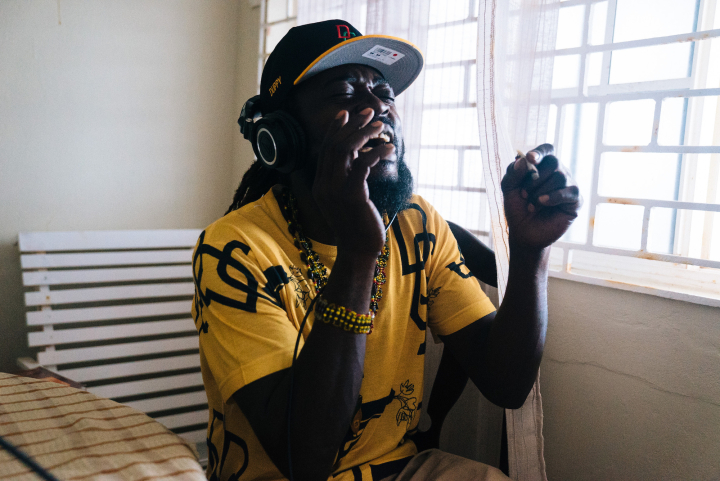
I-Jah’s name literally means ‘I love Jah’: he loves the ‘creator '. He lives and breathes this mindset, putting all his passion into his artists and creativity. Music was as natural to I-Jah as water: he recalls growing up and seeing pictures of ‘ this man on the wall with a big guitar’ at his grandmother’s house: his grandmother explained the man was his uncle Roy Johnson, better known as ‘Ashanti Roy' from ‘The Congos’.
With such a rich musical heritage, a life in music was always an aspiration , and I-Jah spent his early years grafting to make his dreams a reality. Look around, most young musicians know the struggle of trying to make a career whilst making ends meet. The majority of us might work behind a bar, wait tables or clean cars to keep ourselves afloat, but I-Jah being a man of many talents, managed to pay the bills by embarking on a career as a professional footballer at Waterhouse FC.
His two passions eventually came to a head: after losing 1-0 against Tivoli Gardens, he was out of job for 6 months. I-Jah places the blame on the coach being angry at him for attending a clash the night before the game: ‘ I mashed up the dance, then 2 days later after the match I lost my job’.
Despite these setbacks, I-Jah’s journey led him to where he needed to be: playing at Waterhouse F.C is where he finally met his uncle Ashanti Roy. The two had never previously met, but after I-Jah explained that he was his nephew, the two began spending time together, with I-Jah staying at ’s house for a while. ‘Learning the craft..he inspired me a lot,’ remembers I-Jah. “Seeing all the amazing musicians come through the house watching them... It was one of my dreams to find him, come here and learn his craft - he meant a lot to me”
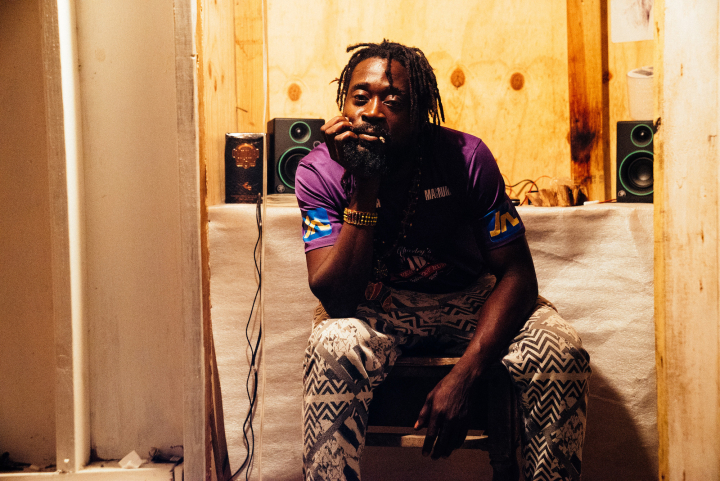
I-Jah met Sun Araw and M. Geddes Gengras when they came to record with his uncle and The Congos. I-Jah would hang out during the studio sessions, chatting with Stallones in between takes, and quickly fell in love with Stallone’s cerebral instrumentals. I-Jah explains how the ``riddims were so electronic and out of orbit, like I could sit in a spaceship and drive anywhere I wanted to be!’. So that's exactly what he did. He put some money together to pay for studio time, Stallones and Geddes gave I-Jah the opportunity to put vocals on the ‘leftover’ riddims from the original sessions with The Congos. Sun Arraw and M. Ged believed that these productions were too wild for anyone to lay vocals over, but just like Neo, I-Jah was “The One”. In a burst of inspiration, I-Jah laid down his vocals in one take, and thus the first ever ‘Duppy Gun’ record, ‘Spy’ was born.
Entering the world of experimental music for I-Jahabar wasn’t just new, it was educational. Through working with Sun Arraw and M-Geddes he gained an invaluable insight into the workings of the wider music industry, and he has been able to pass on what he has learnt to his community of artists, teaching them the fundamentals of business practices which allow them to not just make music, but live off it. From an organisational standpoint, Duppy Gun is different, not being run like a traditional label. There’s also a massive elephant in the room - how do two white guys from the US co-run a Jamaican dancehall label? In the past, similar projects have seen Jamaica artists wrongfully taken advantage of, and the island’s culture exploited. However, Duppy Gun’s creators approach the project with a level of cultural sensitivity and historical awareness that places the curators on equal footing with the artists, making it an honest artistic exchange. The label isn’t profit driven; its inherent value is its ability to provide a platform for upcoming artists. This is apparent from the enthusiasm with which I-Jah speaks about his artists: it’s evident that this is a long term investment, based firmly around creating a self-sustaining community of artists.
This sense of honesty is reflected in the music. Whilst some experimental music can feel overly considered, as if intended to be played to crowds of stern faced chinstrokers, there’s a sense of unabashed enthusiasm in all of the Duppy Gun releases. The instrumentals and vocals are always weird, lopsided and chaotic, but retain a sense of fun: it feels like the musicians involved are tweaking their equipment with gleeful abandon, devoid of any preconceptions, without thinking about who’s listening.
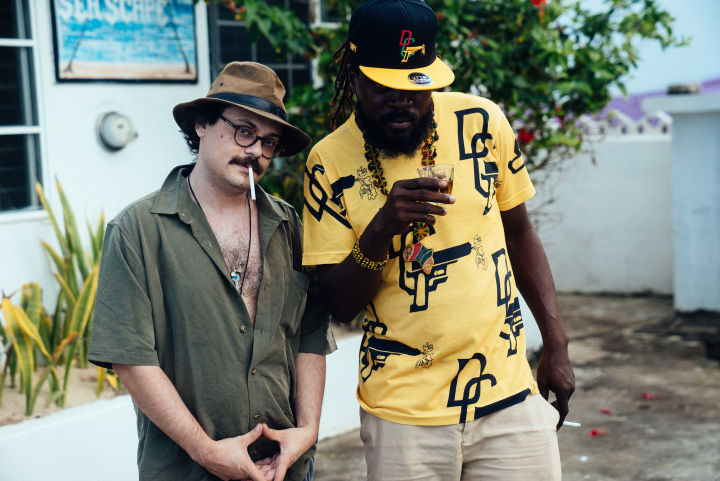
I-Jah takes a great deal of pride in his roster of artists, making sure we get the chance to talk to his up and comers such as Darkchild, the latest vocalist to join the team. Adding to the label's female roster along with producers DJ Smurphy & Fyah Flames. Despite there not being many female voices located at the studio in Kingston Darkchild tells us she feels comfortable with the Duppy Gunn family guiding her. When we start speaking about the music scene in Jamaica she says ‘Jamaica‘s a violent place; they say the music we do influences the youth so maybe we can influence them to do positive things.’ She believes that with Duppy Gunn she will be able to not just give people one sound, but demonstrate her versatility as an artist. This means everything to her, and that's why she’s never been scared to jump on anything she gets sent, no matter how off-kilter the riddims may be. It’s clear from speaking to I-Jah he has a lot of faith in his artists, especially Darkchild, who has a forthcoming EP with the likes of the renowned SeekersInternational on the production.
Another I-Jahbar prodigy is G-Sudden, the star of the song 'Gran A Day’. For those of us who don't speak Patois, ‘Gran A Day’ is actually an anthem encouraging women to seek financial independence. ‘Most of mi songs are uplifting’, he says. Equally, G Sudden’s lyrics aren’t born from blind optimism; his lyricism deals with reality: “Even if we sing about violence, we talkin about what’s going round society and what’s going on around [us]. We don’t appreciate violence … we present to the people, and let them know, be careful of violent people”. G Sudden’s outlook sums up the Duppy Gun ethos; Duppy Gun is trying to send a message of positivity, but also teach the artists how the industry works and offer a pragmatic perspective on the music business. Along with being one the Duppy Gunn artists G-Sudden is also the “Public Relations Manager” ,viewing himself as a manager and spokesperson for the label of Peace and positivity is the message.
For I-Jah, times have changed: his football days are far behind him and the path in front of him is becoming clearer day by day. ‘It's time for reaping cuz it’s manifesting now. Experimental music is a niche scene like anywhere else, but especially so in Jamaica where Dancehall rules supreme, making a label like Duppy Gun a massive step away from the status quo. I-Jah admits to knowing nothing about the scene and his audience outside of Jamaica before Duppy Gun’s release on Stones Throw; the process of releasing internationally has taught him a lot about what is possible within the industry and made him eager to push things forward in his country’s scene. ‘In Jamaica people don’t know you can do riddims only and make money from it’. The moment he really started to believe came soon after seeing Sun Araw playing tracks on ‘Boiler Room’.
Compared to regular dancehall riddims, Duppy Gunn’s are very unearthly; he tells us stories of going to Clashes where they wouldn't play his music, and despite the success of the label it hasn't always been easy. Experimental music is a niche scene anywhere, especially in Jamaica, and it was often difficult to find ways for the music to reach the right audience. Duppy Gunn first found a home with Stones Throw, releasing their first ever compilation, but have since developed a better fit with Bristol based Bokeh Versions, run by Miles “Bokeh Edwards” Opland. One might say the labels are kindred spirits: Bokeh Versions has long been a hub for twisted dub experiments from the South West and beyond. After coming across the initial compilation on Stones Throw, he was immediately intrigued. “I was really into crazy 2000s dancehall, really really loose stuff,” he says. “[Duppy Gun] is about madness, and I hadn’t heard that in dancehall in a long time I suppose”.
In keeping with the surreal nature of the Duppy Gun story, his place in the Duppy Gun family was cemented following a chance encounter with Stallones at a gig in Bristol, where Opland had been enlisted to help out at the last minute. After some loose-lipped conversation in the “green” room, Opland offered to help out with the project, which had effectively been on hiatus due to Stallone's and Geddes’ busy touring schedules. Opland recalls: “I think we’d both known about what each other were up to, but we got on really well and I was just like: “look, I’ve noticed you haven’t done that much for a while with the Duppy Gun stuff, and I’d love to help and do something”.
Opland used his experience and connections from years of running Bokeh Versions to link I-Jahbar up with a crew of experimentally inclined producers from around the world, such as Canadian-based trio Seekers International, widening the scope of the project in a natural way. However, despite his influence on the project, Opland sees his role as an auxiliary one, helping to build a working administrative infrastructure that will enable the Duppy Gun crew to independently distribute their art once again. “It’s about helping and supporting and elevating”, he says. “There may well come a time when [Duppy Gun] become its own label again, when its too big for me to handle - I feel like it’s coming quite soon”
Duppy Gun’s future looks bright. With Dark Child’s SeekrsIntrnational produced debut EP on the horizon, there are also plans to further expand the network of Duppy Gun producers, with collaborations featuring Feel Free Hi Fi and Japan’s Riddim Chango crew in the pipeline. In addition, I-Jah’s always been someone who’s made his dream a reality, but this time he’s doing it quite literally with his own hands: with the help of fellow duppy Gunn artist RDL Shellah, they are building the Duppy Gun Guest House in Jamaica. The Guest House will provide a space for artists, friends and members of the wider Duppy Gun family to meet face to face, write music together and break bread. Please feel free to donate to the construction of the Guest House if you can, and help keep the Duppy Gun family growing - there’s a link below this article where you can find further information.
Here’s to the next 10 years.
To celebrate 10 years of Duppy Gunn, the labels Bandcamp will be doing a 'pay what you like for the next 48 hours, with the hopes of in the hopes of raising money to complete the Duppy Gunn Guesthouse. Please donate what you can
